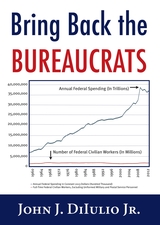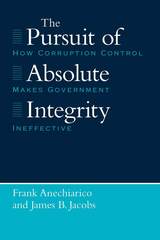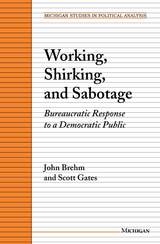
In Bring Back the Bureaucrats, John J. DiIulio Jr., one of America’s most respected political scientists and an adviser to presidents in both parties, summons the facts and statistics to show us how America’s big government works and why reforms that include adding a million more people to the federal workforce by 2035 might help to slow government’s growth while improving its performance.
Starting from the underreported reality that the size of the federal workforce hasn’t increased since the early 1960s, even though the federal budget has skyrocketed. The number of federal programs has ballooned; Bring Back the Bureaucrats tells us what our elected leaders won’t: there are not enough federal workers to work for our democracy effectively.
DiIulio reveals that the government in America is Leviathan by Proxy, a grotesque form of debt-financed big government that guarantees terrible government. Washington relies on state and local governments, for-profit firms, and nonprofit organizations to implement federal policies and programs. Big-city mayors, defense industry contractors, nonprofit executives, and other national proxies lobby incessantly for more federal spending. This proxy system chokes on chores such as cleaning up toxic waste sites, caring for hospitalized veterans, collecting taxes, handling plutonium, and policing more than $100 billion annually in “improper payments.” The lack of competent, well-trained federal civil servants resulted in the failed federal response to Hurricane Katrina and the troubled launch of Obamacare’s “health exchanges.”
Bring Back the Bureaucrats is further distinguished by the presence of E. J. Dionne Jr. and Charles Murray, two of the most astute voices from the political left and right, respectively, who offer their candid responses to DiIulio at the end of the book.

A love for nature and the forest drew Tomas Koontz to develop a keen interest in the workings of public forest management and forest policy. Beyond policy, however, this book is also about the very human issues of federalism, decentralization of control over public lands, citizen participation, and how agency policies, both state and federal, are formulated and exercised.
Federalism in the Forest is the first book to examine and compare public policy performance across both state and national levels, explaining why state agencies excel at economic outputs and profitability, the management of land with state income in mind-while national agencies are stronger in citizen participation and the inarguably important role of environmental protection. Instead of focusing on historical development of federal-state roles or on state officials as affected by national polices, Koontz shows how officials, when given authority, both make and implement policy at the state versus the national level. Although arguments fly about the decentralization of public lands-most often based on ideology-Koontz offers empirical evidence that demonstrates not only that devolution matters, but how.

The creation and preservation of capable states is a lengthy, laborious, and multifaceted process, fraught with opportunities for failure and misspent resources. It requires time, commitment, innovative ideas, consensus building, new rules of the game, efficient design and resource allocation in technical assistance, and considerable good luck. By the mid-1990s, the imperative to improve government performance had been added to the development agenda precisely because of greater awareness that neither markets nor democracies could function well--or perhaps function at all--unless governments' efficiency, effectiveness, and responsiveness are improved.
This publication seeks to help understand how governments can be encouraged to perform better and how state capabilities can be developed in ways that allow markets and democracies to flourish. The contributors draw comparative lessons from specific efforts designed to enhance human resource development in the public sector, to strengthen organizations that contribute to the public purpose of government, and to reform the institutions that set the rules for economic and political interaction.
Getting Good Government will be of interest not only to public officials and public management and policy analysts, but also to political scientists and international development specialists.

Measuring the Performance of the Hollow State is the first in-depth look at the influence of performance measurement on the effectiveness of the federal government. To do this, the authors examine the influence of the Government Performance and Results Act of 1993 (with consideration of the later Program Assessment Rating Tool of 2002) on federal performance measurement, agency performance, and program outcomes. They focus a systematic examination on five agencies in the U.S. Department of Health and Human Services—the Food and Drug Administration, the Centers for Medicare and Medicaid Services, the Health Resources and Services Administration, the National Institutes of Health, and the Indian Health Service. Besides representing a wide range of federal government organizational structures and program formats, these agencies offer a diverse array of third-party arrangements including states, native American tribes, scientists, medical schools, and commercial and nonprofit health care intermediaries and carriers.
Exploring the development of performance measures in light of widely varying program mandates, the authors look at issues that affect the quality of this measurement and particularly the influence of program performance by third parties. They consider factors such as goal conflict and ambiguity, politics, and the critical role of intergovernmental relations in federal program performance and performance measurement. Through their findings, they offer illumination to two major questions in public management today—what are the uses and limitations of performance measurement as a policy and management tool and how does performance measurement work when applied to the management of third-party government?
While scholars and students in public administration and governmental reform will find this book of particular interest, it will also be of use to anyone working in the public sector who would like to have a better understanding of performance measurement.

"Anechiarico and Jacobs . . . have pushed aside the claims and posturing by officials and reformers and revealed a critical need to reevaluate just what we have and are doing to public servants, and to the public, in the name of anti-corruption."—Citylaw
"A timely and very useful addition to the new debate over corruption and reform."—Michael Johnston, American Political Science Review

READERS
Browse our collection.
PUBLISHERS
See BiblioVault's publisher services.
STUDENT SERVICES
Files for college accessibility offices.
UChicago Accessibility Resources
home | accessibility | search | about | contact us
BiblioVault ® 2001 - 2024
The University of Chicago Press









